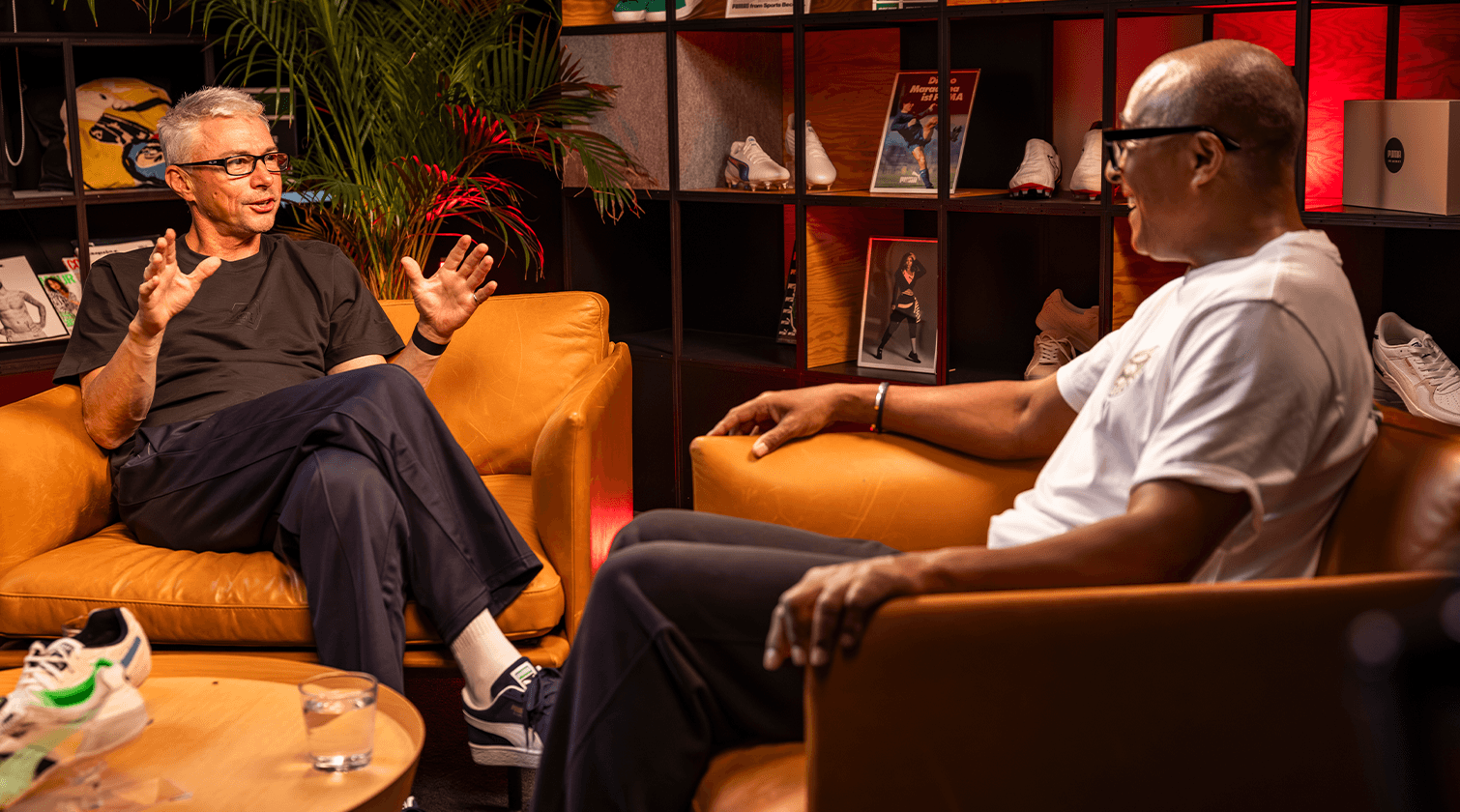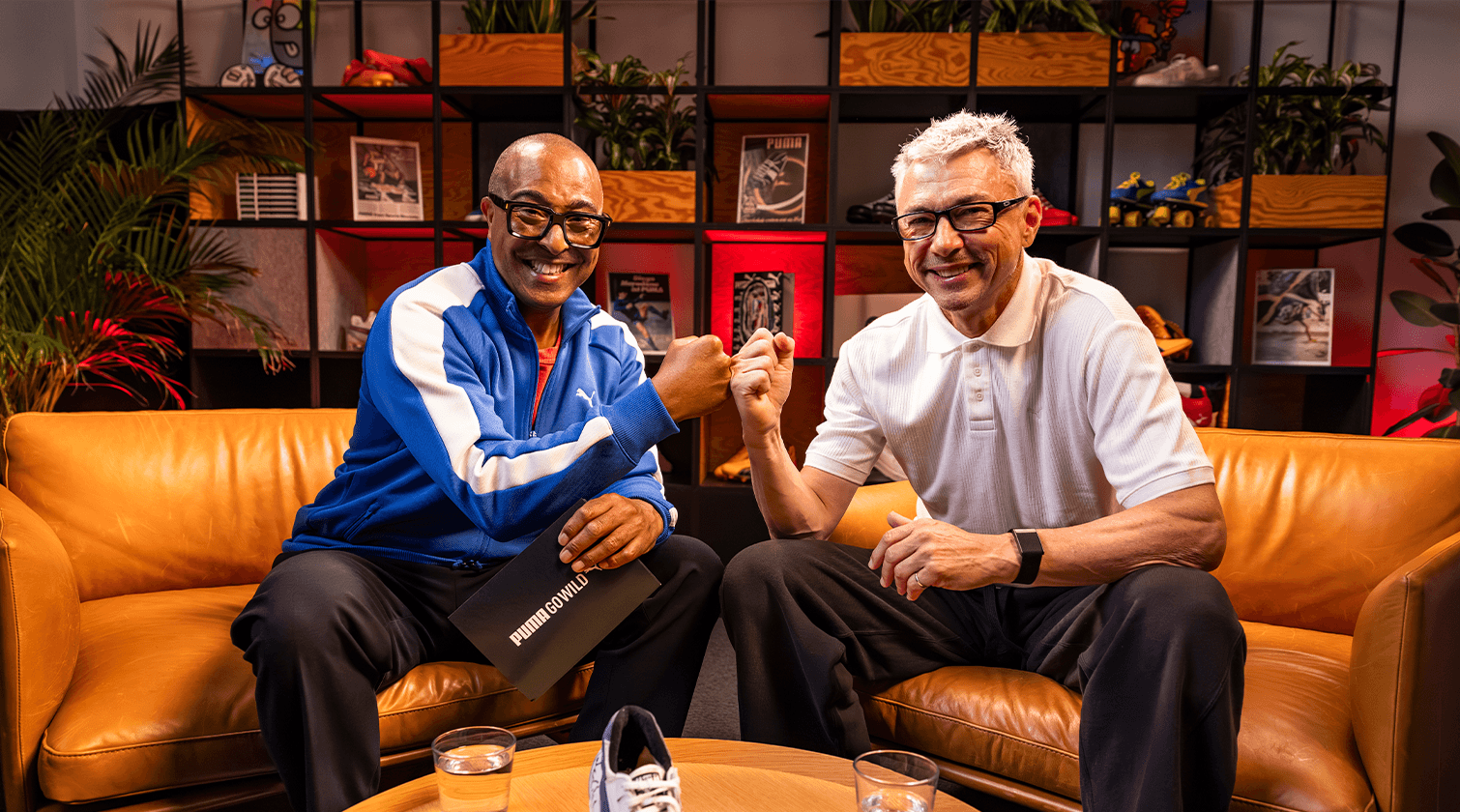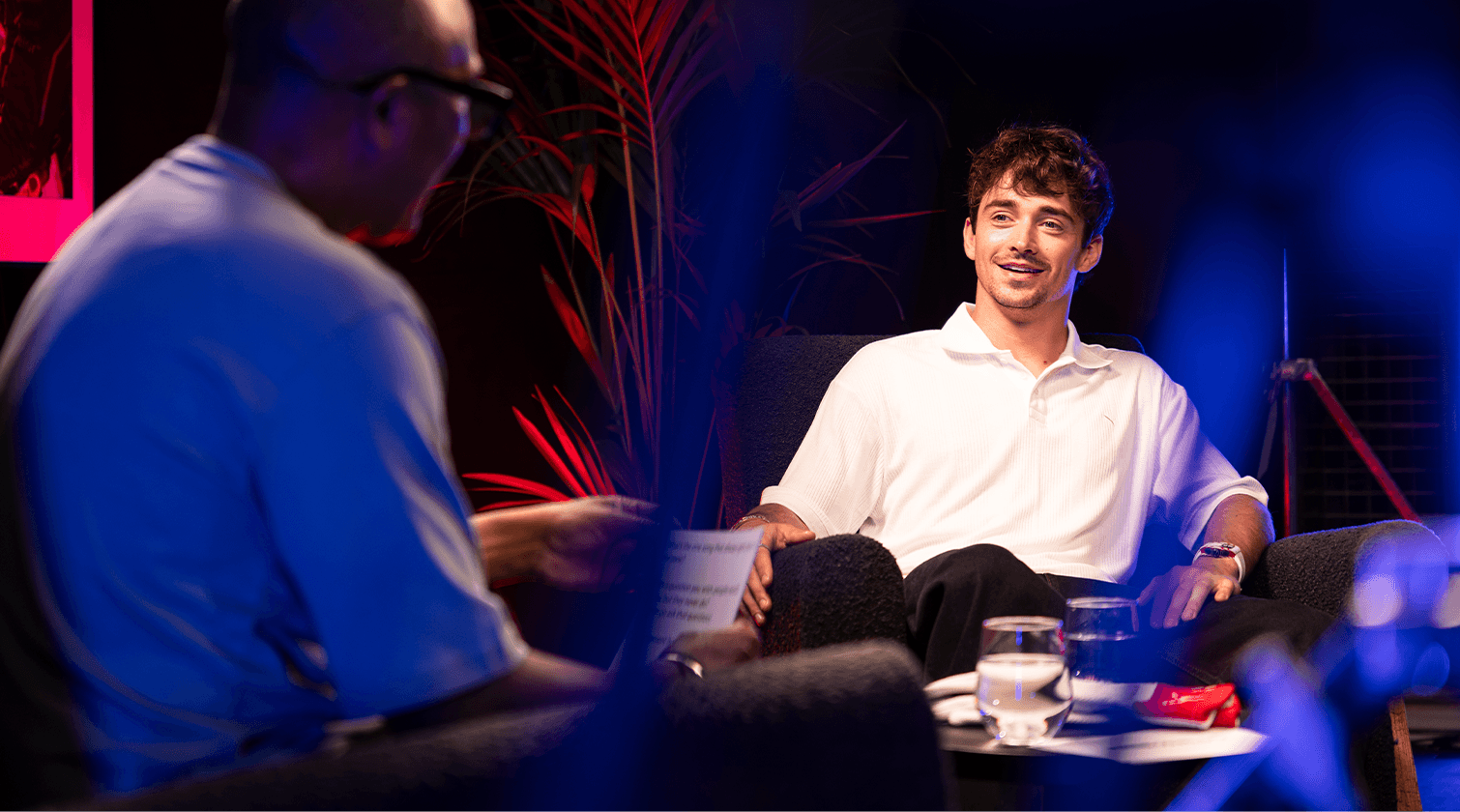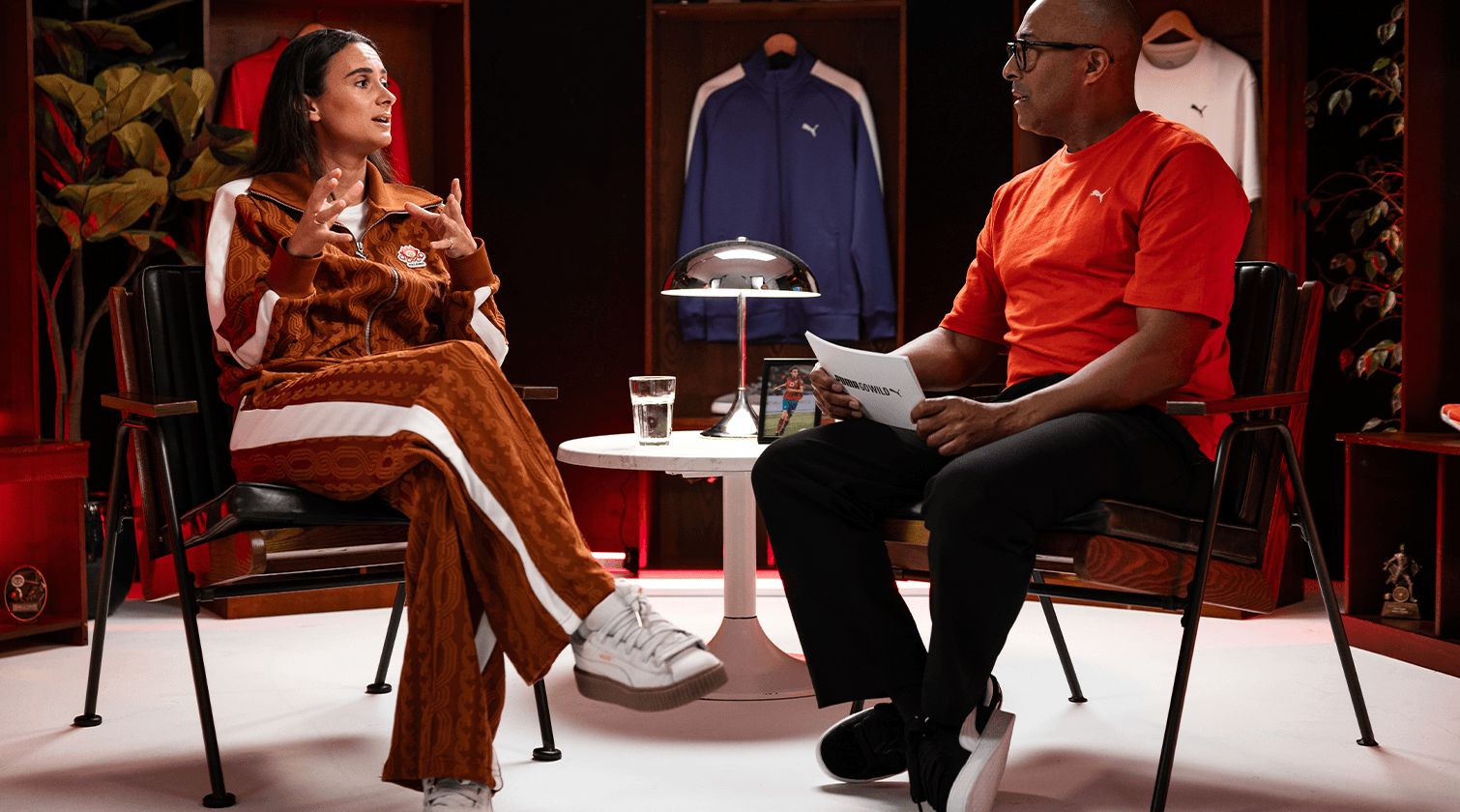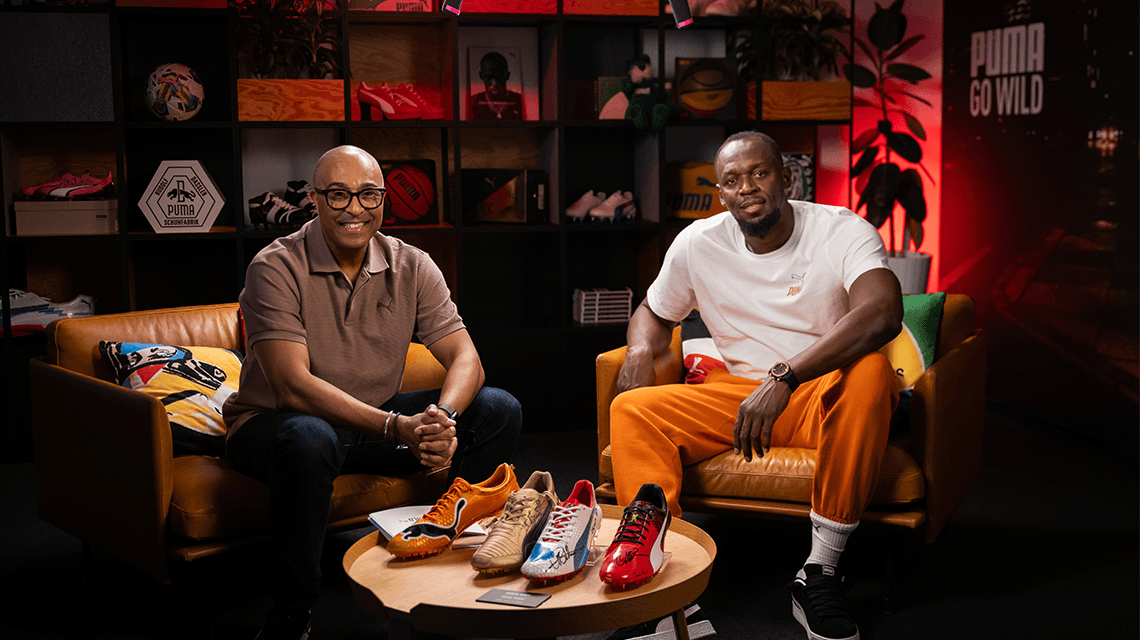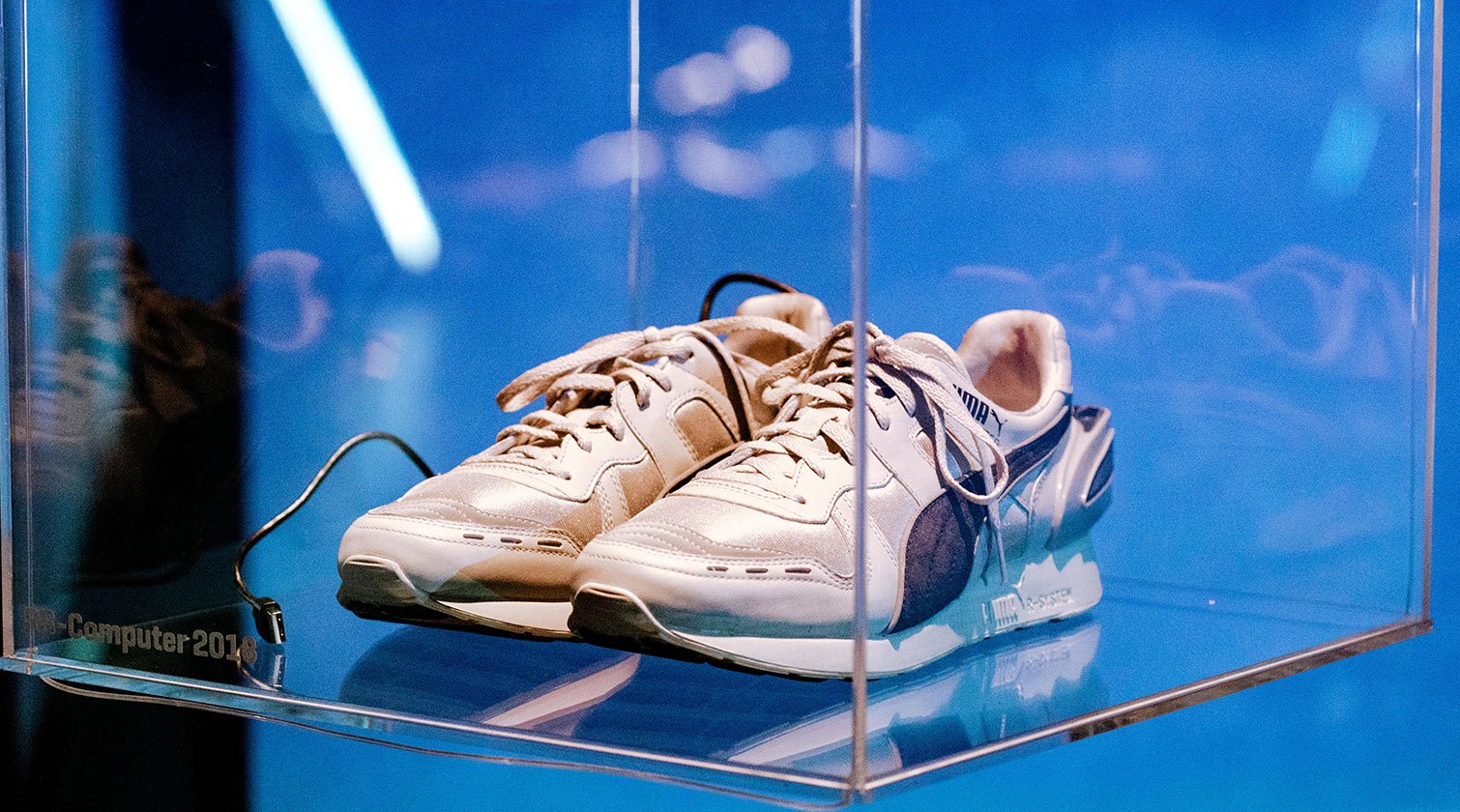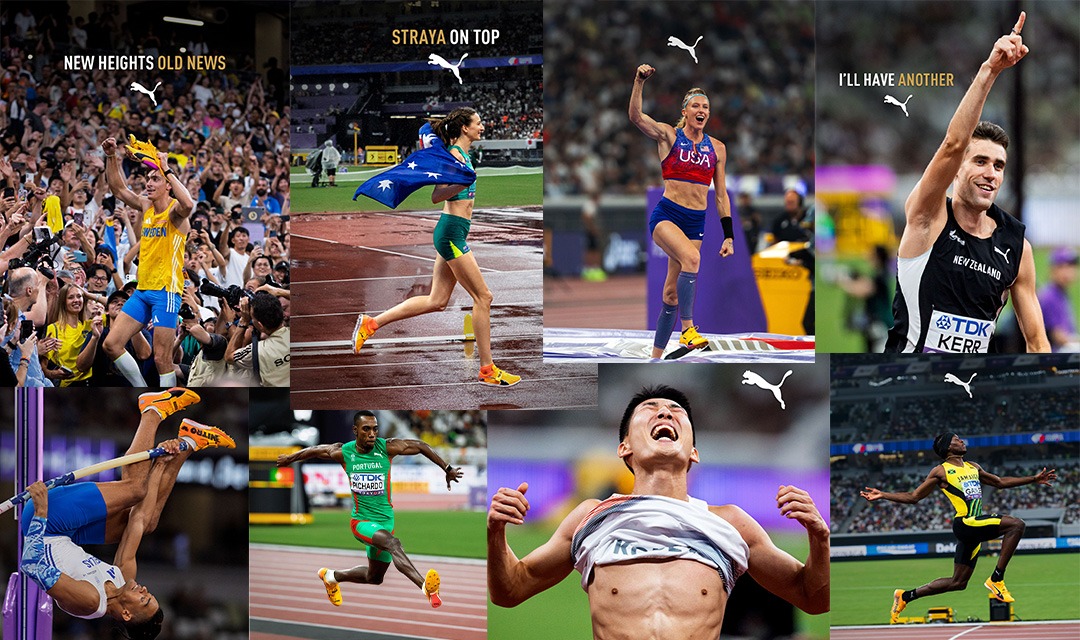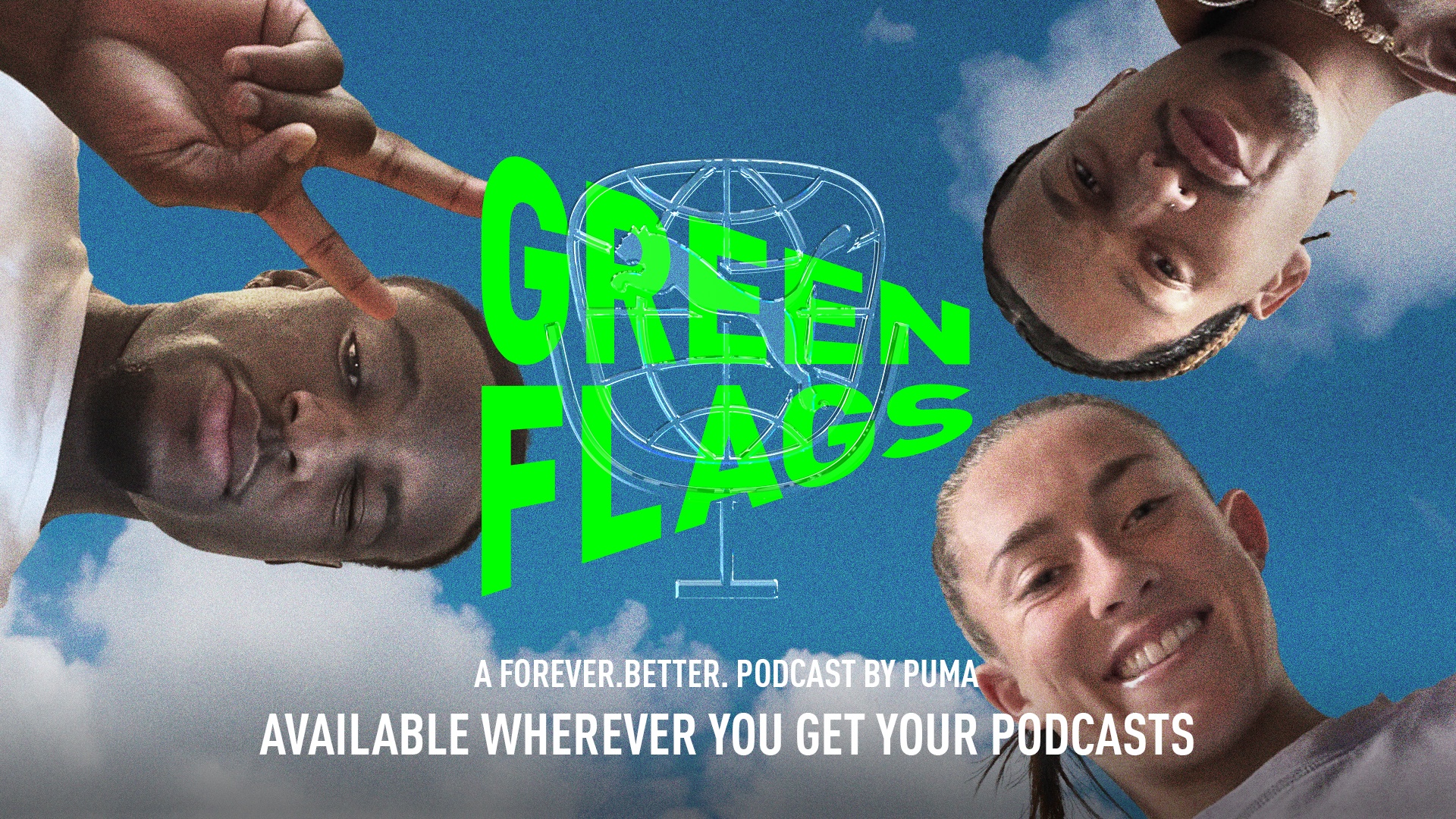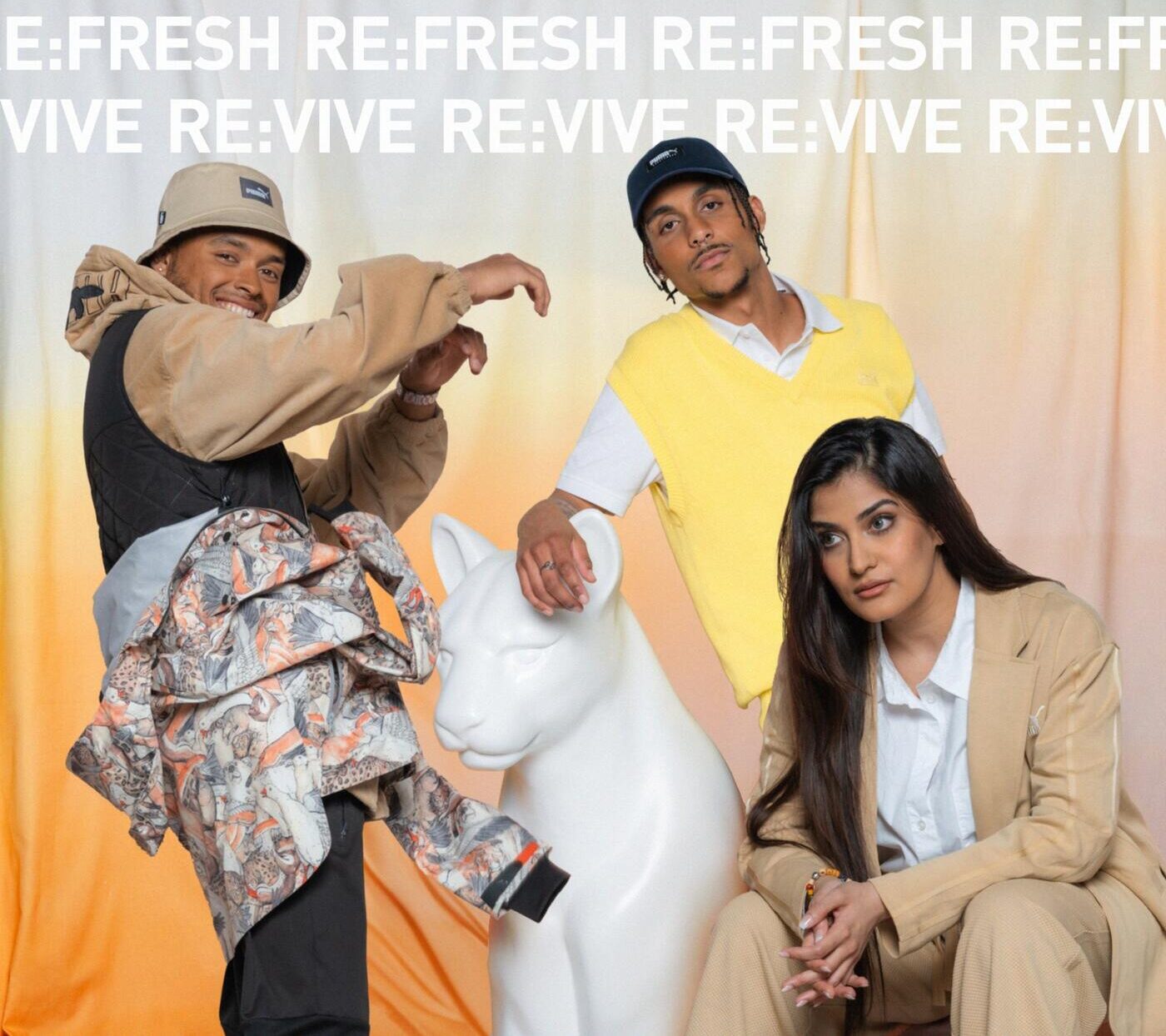
“You can’t control everything – only how you respond to it.”
Colin Jackson and Jonathan Edwards: two champions on failure, fulfilment – and moving forward.
August 6, 2025
On August 7th, 1995, Jonathan Edwards jumped farther than any human before – and since. At the World Championships in Gothenburg, he became the first triple jumper to break the 18-metre barrier. His 18.29-metre leap still stands – one of the longest-lasting records in sport, and a symbol of precision and mastery.
At PUMA’s headquarters in Herzogenaurach, Edwards met with Colin Jackson – former teammate, rival, friend. Jackson ruled the 110-metre hurdles for over a decade: two-time World Champion, Olympic silver medallist, and world record holder for more than ten years.
Both reached the very top – and both know what it feels like to fall short. What remains when you’ve achieved it all? A conversation about resilience, identity – and how to live with victory, and what comes after.
Both reached the very top – and both know what it feels like to fall short. What remains when you’ve achieved it all? A conversation about resilience, identity – and how to live with victory, and what comes after.
Jonathan, Colin – what are your strongest memories from that time in the sport? Which moments stayed with you?Colin Jackson: The track. That’s where everything happened. The 1992 Olympics – I was in top shape, I was the favourite – and I didn’t win. That shook me. But it shaped me. I had to learn that success is never guaranteed. And that you shouldn’t define yourself by gold. Sport isn’t kind – but it’s honest. If you learn to cope with it, you learn to cope with life.
Jonathan Edwards: The most formative moments came from athletics. During my career, I was functioning. Today I see that these experiences shaped me in every way. Sport was an accelerator – everything happened condensed, without protection. Emotions, expectations, failure, success – you couldn’t hide anything. If you get through that, you come out stronger.
Jonathan Edwards: The most formative moments came from athletics. During my career, I was functioning. Today I see that these experiences shaped me in every way. Sport was an accelerator – everything happened condensed, without protection. Emotions, expectations, failure, success – you couldn’t hide anything. If you get through that, you come out stronger.
“I wasn’t born resilient. I became resilient.”
Jonathan EdwardsIs resilience something you’re born with – or something you have to learn?Colin: I believe you bring a certain core stability with you. But that alone isn’t enough. You’re tested – again and again. Only then do you find out if you’re truly resilient: if you get back up after defeat, keep going after injury, still believe in yourself when others don’t. Sport isn’t fair. Neither is life. Resilience isn’t a superpower – it’s a mindset.
Jonathan: Resilience has become a buzzword. Back then, people just said: “Get on with it.” But behind that lies a value system: don’t give up, get back up, help others, keep going – even when it hurts. And it’s not something you build alone. It grows through connection, through community. Looking back, I’d say: I wasn’t born resilient. I became resilient.
Jonathan: Resilience has become a buzzword. Back then, people just said: “Get on with it.” But behind that lies a value system: don’t give up, get back up, help others, keep going – even when it hurts. And it’s not something you build alone. It grows through connection, through community. Looking back, I’d say: I wasn’t born resilient. I became resilient.
When you look back today – do you remember the highlights or the hard work more?Colin: The hard work was the foundation – but looking back, it’s the moments when everything clicked that stay with me. When your body responds, your mind is calm, your rhythm’s right. Just fractions of a second – but unforgettable. The path was brutal. Sometimes I’d run alone through the snow in Cardiff. But you do it for that one moment. And when it comes – the pain disappears.
Jonathan: I remember both – but differently. The highlights are like beacons: my world record, the gold medal. But the work behind it is the ground you stand on. And sometimes I miss that. The clarity. The simplicity of being an athlete – no chaos, no overload. Life’s more complex now. Back then, it was all about focus, filtering, staying the course.
Jonathan: I remember both – but differently. The highlights are like beacons: my world record, the gold medal. But the work behind it is the ground you stand on. And sometimes I miss that. The clarity. The simplicity of being an athlete – no chaos, no overload. Life’s more complex now. Back then, it was all about focus, filtering, staying the course.
“The track is honest. If you can handle sport, you can handle life.”
Colin JacksonWhat mattered more: discipline or adaptability? And how did you manage to keep motivating yourselves?Jonathan: I was very disciplined – but without adaptability, I wouldn’t have made it. The body changes. Technique evolves. You change – and you have to constantly adjust your training. What motivated me was never the thought of medals – it was the drive to improve.
Colin: For me, it was discipline. I was very structured: fixed routines, little leeway. I don’t believe in motivation as a prerequisite – I believe in preparation. If I had to be on the track at 7:30, I was there at 7:20. Always. But I also knew: you can’t control everything – and that’s where adaptability comes in. If your body doesn’t cooperate, you have to adjust.
Colin: For me, it was discipline. I was very structured: fixed routines, little leeway. I don’t believe in motivation as a prerequisite – I believe in preparation. If I had to be on the track at 7:30, I was there at 7:20. Always. But I also knew: you can’t control everything – and that’s where adaptability comes in. If your body doesn’t cooperate, you have to adjust.
What was the toughest phase of your career – physically or mentally? And what helped you push through?Colin: The mind was the bigger opponent. There were times I was physically at my peak – but emotionally drained. You train like crazy, perform great in practice – and then the big race comes, and you can’t deliver. What kept me going was my routine.
Jonathan: I often got very nervous before competitions. That inner voice saying: You’re not good enough. You’ll fail. I never thought: I’m going to win this. But over time, I learned: these thoughts are part of me – not my enemy. And I knew: once I’m at the end of the runway – I’ll deliver. The moment itself was usually very clear.
Jonathan: I often got very nervous before competitions. That inner voice saying: You’re not good enough. You’ll fail. I never thought: I’m going to win this. But over time, I learned: these thoughts are part of me – not my enemy. And I knew: once I’m at the end of the runway – I’ll deliver. The moment itself was usually very clear.
Was your retirement from competitive sport a clean break – or more of a gradual transition? And how hard was it to let go?Colin: To the outside world, it looked like a clean break. I was still competing in summer 2002 – then suddenly standing trackside with a mic, while Jonathan was still jumping. I remember that moment clearly: suit, microphone – but inside, it was a process. The identity you’ve built over decades doesn’t vanish overnight. Some days, I just wished I could train again. No mic, no media, no doubts.
Jonathan: I can completely relate. I was 37, had achieved everything – and had an injury that told me: this is it. I’d actually planned to continue until 2004. What helped was perspective: the BBC showed interest, I could stay in the game – just in a different role. Then came London’s Olympic bid – that was huge. I didn’t fall into a hole, and I’m grateful for that. But yes – suddenly, there was silence. I had to get used to life with less adrenaline.
Jonathan: I can completely relate. I was 37, had achieved everything – and had an injury that told me: this is it. I’d actually planned to continue until 2004. What helped was perspective: the BBC showed interest, I could stay in the game – just in a different role. Then came London’s Olympic bid – that was huge. I didn’t fall into a hole, and I’m grateful for that. But yes – suddenly, there was silence. I had to get used to life with less adrenaline.
Did you feel the need to reinvent yourselves after your careers – or were you able to carry your strengths into the next chapter?Colin: A bit of both. I took a lot with me – discipline, structure, preparation. But I had to build new skills. Speaking in front of large audiences, for example. Talking freely, without a script, in front of cameras. I was an athlete – not a speaker. I had to learn that from scratch. If you want something new – you have to evolve
Jonathan: As an athlete, you’re constantly refining: listening to coaches, analysing technique, working on details. That mindset – of not knowing everything, but being willing to learn – I carried with me. I never felt I had to reinvent myself. It was more: now I get to show a different side of what’s already inside me.
Jonathan: As an athlete, you’re constantly refining: listening to coaches, analysing technique, working on details. That mindset – of not knowing everything, but being willing to learn – I carried with me. I never felt I had to reinvent myself. It was more: now I get to show a different side of what’s already inside me.
Thanks, Jonathan & Colin, for taking the time and sharing your stories with us!
Meet The Legends
Born in 1966 in London and raised in Devon in a deeply religious family, Jonathan Edwards became a triple jump icon. In 1995, he became the first man to legally break the 18-metre barrier – a world record that still stands today. As a key member of Britain’s “Fantastic Four,” he defined an era. Edwards now lives near Newcastle with his family and works as a BBC presenter and advisor to sports organisations.
Born in 1967 in Cardiff, Colin Jackson was part of the legendary “Fantastic Four” – the golden generation of British athletics in the 1990s. He dominated the 110-metre hurdles, became World Champion twice, and held the world record for over a decade. Years after retiring, he came out publicly as gay – and has since become a prominent voice in media and public life. Jackson lives in London and works as a TV expert and motivational speaker.
Want to hear more legendary stories?
Tune in to the latest PUMA Go Wild Podcast as Olympic legend Jonathan Edwards shares the story behind his still-unbroken Triple Jump World Record—and the mindset that took him there ⬇️.
Go Wild Podcast | Ep.8 Jonathan Edwards: Pretty cool to be on my deathbed and still hold the record
From a seaside town in Devon to the top of the athletics world, PUMA ambassador and Olympic triple jump record holder, Jonathan Edwards, took an unlikely route to greatness. On Go Wild, he reflects on being a late bloomer, finding belief in himself, and the technique that set him apart from the world’s best. It’s a story of perseverance, precision, and the surprising wild moments behind a record that’s stood for nearly 30 years. #PUMA #GoWild
👂 More Epidodes
Catch up now speaks more languages
To enable as many users as possible to connect with us and be part of our world, we offer CATch up in English, German, French, and Spanish. Please note that these translations are automated and may contain errors.
